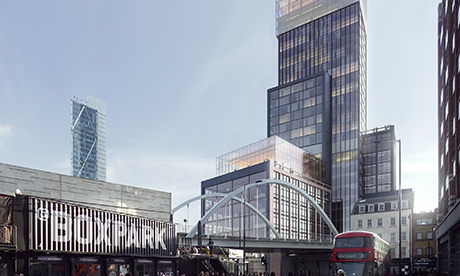Council waves through plans for 30-storey hotel complex in Shoreditch

Highgate Holdings gets green light to bed down in Shoreditch. Image: Gensler
Hackney Council has granted planning permission for a 30-storey hotel complex on Shoreditch High Street, even though it is campaigning against proposals to build several more towers just metres away.
Planning authorities last week approved plans for the four star Shoreditch Highgate Hotel, which will comprise five buildings, the tallest of which is 30 storeys high. As well as 200 beds, the mixed-use scheme includes retail, event and office space – only 10 per cent of which is required to be ‘affordable’.
Campaigners have criticised the council for giving the scheme the green light whilst simultaneously campaigning against proposals to build towers as part of the nearby Bishopsgate Goodsyard scheme.
“It is a surprise that planners recommended for approval the Highgate scheme – which is way out of kilter with the neighbouring area – seemingly without putting up any resistance to it’s scale,” said Nick Perry of the Hackney Society, a campaign group that seeks to preserve the borough’s heritage.
“The recommendation for approval can only undermine the same council officers’ arguments that the adjacent Bishopsgate Goodsyard scheme is too high and will change the character of the area for ever.”
Hackney Council was approached for comment but did not respond by the time of publication.
Bypassing powers
Hackney Mayor Jules Pipe and his counterpart in Tower Hamlets John Biggs, have both strongly opposed a scheme for Bishopsgate Goodsyard that would see the construction of luxury flats, as well as a 46-storey skyscraper, on the site close to Shoreditch High Street station.
The Mayor of London Boris Johnson called in the decision on the Goodsyard scheme in September, bypassing the powers of the Hackney and Tower Hamlets planning authorities.
The hotel will be the first in London for Highgate Holdings, which operates several large hotels in New York. Construction is expected to take two and half years, with works due to start in Spring 2016 and finish at the end of 2018.
Scant contributions
The approved plans are a slight downscale to those put forward earlier this year. The developers have reduced the height of the largest tower from 32 to 30 storeys.
The developers say the “creative office space”, with shared facilities, will suit the start ups prevalent in Tech City.
But campaigners are dissatisfied that only 10 per cent of the workspace will be ‘affordable’.
“The 10 per cent affordable workspace is barely enough to keep many of the low-turnover tech start ups together in a creative technology hub that the industry needs,” said Mr Perry, who also criticised the government’s policy on obliging developers to contribute to the community.
“The scant contributions to the community and infrastructure are the least a scheme like this has to deliver, and reflects a government policy that has long since stopped capturing the massive ‘planning gains’ developers make,” he said.
Contributing £2.5m towards Crossrail and developing a local training and employment plan were further conditions placed on the planning consent. As the scheme is not residential, the developers are not obliged to supply ‘affordable’ housing.
In May, neighbouring nightclub and arts venue Village Underground expressed concern that its rooftop, on which two tube train carriages are perched, would be plunged into darkness by the shadow of the hotel. The nightclub has declined to comment on the approval of the plans.
